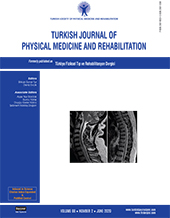The improvement in aerobic capacity, disease activity, and function in patients with rheumatoid arthritis following cardiac rehabilitation program: A single-center, controlled study
2 Department of Cardiology, Istanbul Kartal Koşuyolu Yüksek Ihtisas Training and Research Hospital, Istanbul, Turkey DOI : 10.5606/tftrd.2020.3250 Objectives: This study aims to evaluate the effect of cardiac rehabilitation (CR) on disease activity, functional status, fitness, and modified cardiovascular disease (CVD) risk factors in patients with rheumatoid arthritis (RA) with a moderate disease activity.
Patients and methods: This single-center, controlled study included a total of 60 female RA patients (mean age 57.5 years; range, 50 to 64 years) with moderate disease activity according to the Disease Activity Score-28 (DAS28) between January 2014 and June 2015. The patients were divided into two equal groups as those receiving CR program (n=30) and those receiving home exercise program (HEP; n=30). The patients were evaluated at baseline, at Weeks 10 and 24 using exercise tolerance test (i.e., The Metabolic Equivalent of Task [MET] and maximal oxygen uptake [VO2 max]), Six-Minute Walk Test (6MWT), DAS28, Health Assessment Questionnaire (HAQ), modified Systematic Coronary Risk Evaluation (mSCORE), Short Form Health Survey-36 (SF-36), and Beck Depression Inventory (BDI).
Results: There was a significant improvement in the VO2 max (p<0.001), MET (p<0.001), DAS28 (p<0.001), HAQ (p<0.001), BDI (p=0.005), SF-36 physical function (p=0.039), pain (p<0.001) and vitality subscale scores (p=0.008), and 6MWT (p<0.001), after the initial and repetitive exercise programs in the CR group compared to the HEP group. At the end of Week 24, full compliance with HEP was higher in the patients with CR group, compared to the HEP group (p<0.001). There was no significant effect of supervised exercise program on the mSCORE, although systolic blood pressure (p=0.033) and resting heart rate (p=0.049) were significantly improved in the CR group versus HEP group.
Conclusion: Based on our study results, supervised exercise program cannot reduce CVD risk as assessed by the mSCORE, although it improves physical fitness, disease activity, and functional outcomes which may reduce traditional CVD risk factors in patients with RA.
Keywords : Cardiac rehabilitation, cardiovascular risk, home exercise, rheumatoid arthritis

















